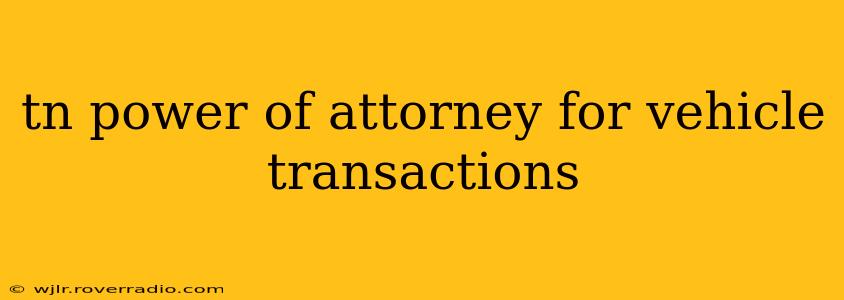Selling, buying, or even just titling a vehicle in Tennessee can be a complex process. Having a properly executed Power of Attorney (POA) can significantly simplify these transactions, especially if you're unable to handle them yourself or need to entrust someone else with the responsibility. This guide will delve into the specifics of Tennessee powers of attorney related to vehicle transactions, answering common questions and providing essential information.
What is a Power of Attorney for Vehicle Transactions in Tennessee?
A Tennessee Power of Attorney for vehicle transactions is a legal document that grants an individual (the "agent" or "attorney-in-fact") the authority to act on behalf of another person (the "principal") in matters concerning vehicle ownership and transfer. This authority can include, but isn't limited to, buying, selling, trading, titling, registering, and financing vehicles. The scope of the power granted is entirely defined within the document itself. It's crucial to specify exactly what actions the agent is authorized to perform. A general POA might not cover vehicle transactions specifically, leading to complications.
What are the Different Types of Powers of Attorney in Tennessee?
Tennessee recognizes several types of POAs, each with varying degrees of authority:
- General Power of Attorney: This grants broad authority to the agent to act on the principal's behalf in most matters, but it may not explicitly include vehicle transactions. It's generally advisable to have a specific POA for vehicle transactions.
- Durable Power of Attorney: This type of POA remains in effect even if the principal becomes incapacitated. It’s particularly important for long-term planning.
- Special or Limited Power of Attorney: This grants authority only for specific actions, making it ideal for vehicle transactions. It clearly outlines the agent's powers and prevents them from acting beyond the scope defined.
Do I Need a Special Power of Attorney for Vehicle Transactions?
Yes, for clarity and to avoid any potential legal disputes, it's highly recommended to use a Special Power of Attorney specifically for vehicle transactions. This ensures that your agent only has the authority to handle vehicle-related matters, safeguarding your interests and avoiding unintended consequences.
How Do I Create a Tennessee Power of Attorney for Vehicle Transactions?
Creating a legally sound POA requires careful consideration and often professional assistance. While you can find templates online, it's crucial to understand the legal ramifications. Incorrectly drafted documents can lead to complications and invalidate the agreement. Therefore, consulting with a Tennessee attorney is highly recommended. A lawyer can ensure the document accurately reflects your wishes and complies with Tennessee law.
What Information Should Be Included in the POA?
A well-drafted POA should include:
- Principal's Information: Full legal name, address, driver's license number.
- Agent's Information: Full legal name, address, contact information.
- Specific Authority: Clear and concise language detailing the agent's authority regarding vehicle transactions (buying, selling, titling, etc.). Mention specific vehicle identification numbers (VINs) if applicable.
- Limitations (if any): Any restrictions placed on the agent's authority.
- Duration: The effective period of the POA.
- Signatures: Signatures of both the principal and agent, ideally witnessed and notarized.
What Happens if the Principal Becomes Incapacitated?
If you choose a durable power of attorney, the agent's authority continues even if the principal becomes incapacitated. However, if it's not a durable power of attorney, the agent's authority terminates upon the principal's incapacitation.
Where Can I Find a Sample Power of Attorney Form?
While sample forms exist online, it is crucial to remember that these are templates and might not fully address all aspects specific to Tennessee law and your unique situation. Seek legal counsel to ensure your POA is legally sound and protects your interests.
Can I Use a General Power of Attorney for Vehicle Transactions?
While a general POA might cover vehicle transactions implicitly, it's strongly advised against this practice. A specific POA for vehicle transactions offers better clarity and reduces the potential for disputes or misunderstandings. The specificity minimizes the risk of misinterpretations and protects both parties involved.
This guide offers a general overview and should not be considered legal advice. Always consult with a qualified Tennessee attorney to ensure your POA complies with all applicable laws and adequately protects your rights. The complexity of legal documents necessitates professional assistance for accurate and comprehensive preparation.
